(The Study of Threes)
http://threesology.org
Alternative Thinkers as of 4/4/2021
Paradoxes are a Pair of Boxes. There are multiple arrangements these can occur in. For example, like nesting dolls (one inside the other). Or placed side by side (at two corners) ; One on top of the other; at a single corner; as an actual box or drawing thereof; suspended in air; in the form of two cubes; etc... However, I do not elaborate on these visualizations in this article.
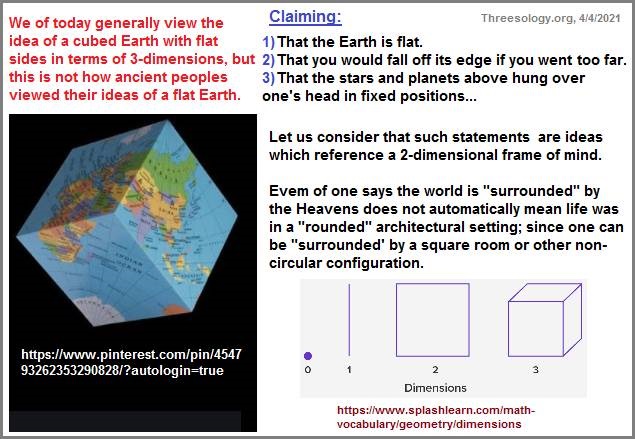
Paradoxes are created by intellectual predators who are otherwise desirous of being an intellectual path finder. Instead of finding a path which will free humans to explore and inhabit uncharted realms beyond conventional intellectual forays into those truths yet to be uncovered, they turn inward and contemplate the meanderings of an otherwise intellectual prowess that finds itself trapped in a labyrinthine structure resembling that of a 2-dimensional landscape which hominid fore-bearers no doubt foraged about in. This 2-dimensional landscape's existence is seen in the old ideological orientations where the world was seen as flat, despite the presence of hills, valleys, oceans, mountains, etc... No less, there at one time existed the notion that if a person traveled far enough they would travel to the edge of the world and fall off. In addition, ideas about a flat sky were revealed in the notion that the Sun traveled "across" the sky as if following a straight path. All of which can be seen in those images which describe humanity living in an outlined box-like world, and continues to this day to be represented in the formulas humans adopt for different life styles.
For example, we sleep in cut out box-like portions called bedrooms, not to mention the box-like references where the word "room" is frequently attached to designate selectively labeled boxes like bathrooms, dining rooms, and work rooms. Alternatively, we have boxes labeled as garages, sheds, kitchens, dens, work shops, junk drawers, closets, shelves, tool boxes, fishing tackle boxes, buses, taxis, cars, trucks, personal space, toy boxes, shoe boxes, hat boxes, safes, briefcases, computer (boxes), alone time, retreat, club house, gym, baseball field/dugout, locker room, class room, lecture hall, courtroom, meeting room, legislative session, football stadium, airplane, spacecraft, etc... Hence, it should be no wonder when we are confronted by ideas which are not explicitly labeled with conventional terms which describe the structure of being box-like, particularly when those ideas are provided by those who are viewed as someone that is smart or intelligent.
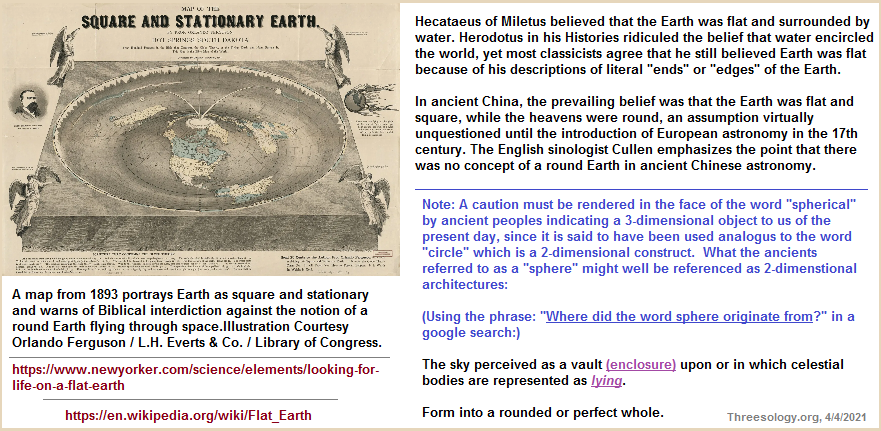
There are multiple types of paradoxes. I need not go into any single one, but a short list may suffice to provide a reference for any reader who is curious to see whether their favorite paradox is listed or the list provides an indication of a paradox that has some familiarity to them:
These paradoxes have in common a contradiction arising from either self-reference or circular reference, in which several statements refer to each other in a way that following some of the references leads back to the starting point.
- Barber paradox: A male barber shaves all and only those men who do not shave themselves. Does he shave himself? (Russell's popularization of his set theoretic paradox.)
- Bhartrhari's paradox: The thesis that there are some things which are unnameable conflicts with the notion that something is named by calling it unnameable.
- Berry paradox: The phrase "the first number not nameable in under ten words" appears to name it in nine words.
- Crocodile dilemma: If a crocodile steals a child and promises its return if the father can correctly guess exactly what the crocodile will do, how should the crocodile respond in the case that the father guesses that the child will not be returned?
- Paradox of the Court: A law student agrees to pay his teacher after (and only after) winning his first case. The teacher then sues the student (who has not yet won a case) for payment.
- Curry's paradox: "If this sentence is true, then Santa Claus exists."
- Epimenides paradox: A Cretan says: "All Cretans are liars". This paradox works in mainly the same way as the liar paradox.
- Grelling-Nelson paradox: Is the word "heterological", meaning "not applicable to itself", a heterological word? (A close relative of Russell's paradox.)
- Hilbert-Bernays paradox: If there was a name for a natural number that is identical to a name of the successor of that number, there would be a natural number equal to its successor.
- Kleene-Rosser paradox: By formulating an equivalent to Richard's paradox, untyped lambda calculus is shown to be inconsistent.
- Knower paradox: "This sentence is not known."
- Liar paradox: "This sentence is false." This is the canonical self-referential paradox. Also "Is the answer to this question 'no'?", and "I'm lying."
- Card paradox: "The next statement is true. The previous statement is false." A variant of the liar paradox in which neither of the sentences employs (direct) self-reference, instead this is a case of circular reference.
- No-no paradox: Two sentences that each say the other is not true.
- Pinocchio paradox: What would happen if Pinocchio said "My nose grows now"?
- Quine's paradox: "'Yields a falsehood when appended to its own quotation' yields a falsehood when appended to its own quotation." Shows that a sentence can be paradoxical even if it is not self-referring and does not use demonstratives or indexicals.
- Yablo's paradox: An ordered infinite sequence of sentences, each of which says that all following sentences are false. While constructed to avoid self-reference, there is no consensus whether it relies on self-reference or not.
- Opposite Day: "It is opposite day today." Therefore, it is not opposite day, but if you say it is a normal day it would be considered a normal day, which contradicts the fact that it has previously been stated that it is an opposite day.
- Problem of Absolute Generality: It initially appears as if we can quantify over absolutely everything (including the expression itself), but this generates the liar paradox.
- Richard's paradox: We appear to be able to use simple English to define a decimal expansion in a way that is self-contradictory.
- Russell's paradox: Does the set of all those sets that do not contain themselves contain itself?
- I know that I know nothing: Purportedly said by Socrates.
10 Paradoxes That Will Boggle Your Mind by Paul Anthony Jones, Feb. 10, 2016
A paradox is a statement or problem that either appears to produce two entirely contradictory (yet possible) outcomes, or provides proof for something that goes against what we intuitively expect. Paradoxes have been a central part of philosophical thinking for centuries, and are always ready to challenge our interpretation of otherwise simple situations, turning what we might think to be true on its head and presenting us with provably plausible situations that are in fact just as provably impossible. Confused? You should be.
- Achilles and the Tortoise.
- The Bootstrap paradox.
- The Boy or Girl paradox.
- The Card paradox.
- The Crocodile paradox.
- The Dichotomy paradox.
- The Fletcher's paradox. (Fletcher [occupation] = Puts feathers on an arrow).
- Galileo's paradox of the infinite.
- The Potato paradox.
- The Raven paradox (aka as Hempel's Paradox).
Another "Paradoxical" resource:
20 Paradoxes That Are True by Mark Manson
- The more you hate a trait in someone else, the more likely you are avoiding it in yourself.
- People who can't trust, can't be trusted.
- The more you try to impress people, the less impressed they'll be.
- The more you fail, the more likely you are to succeed.
- The more something scares you, the more you should probably do it.
- The more afraid you are of death, the less you'll be able to enjoy life.
- The more you learn, the more you realize how little you know.
- The less you care about others, the less you care about yourself.
- The more connected we get, the more isolated we feel.
- The more you're afraid to fail, the more likely you are to fail.
- The harder you push for something, the harder it will feel to achieve.
- The more available something is, the less you will want it.
- The best way to meet someone else is to not need to be with someone else.
- The more honest you are about your faults, the more people will think you're perfect.
- The more you try to keep someone close, the further away you'll push them.
- The more you try to argue with someone, the less likely you are to convince them of your perspective.
- The more choices you have, the less satisfied you are with each one.
- The more convinced someone is that they're right, the less they probably know.
- The only certainty is that nothing is ever certain.
- The only constant is change.
Every single paradox represents some formula of a dichotomy, whether the dichotomy is explicitly noted or not, because of the language and/or setting in which a given paradox takes place and the person or person's assumed to be involved in the telling thereof. Multiple mentally-constructed geometric forms can be used to erect a dichotomous character. To give but one example, the Gordian knot by some accounts was cut in "two"... not three or more. Or else a lynch pin of sorts was pulled to unravel the know to expose its "two" ends... and not multiple ends as would be the case if more than one "string" was used to create a knot or if the knot had been severed by a sword thus creating more than just two ends. (While some readers will think that it is reasonable and logical for there to be references to a "two", this is the point to bring to bear with respect to the presence of a two-patterned mindset.)
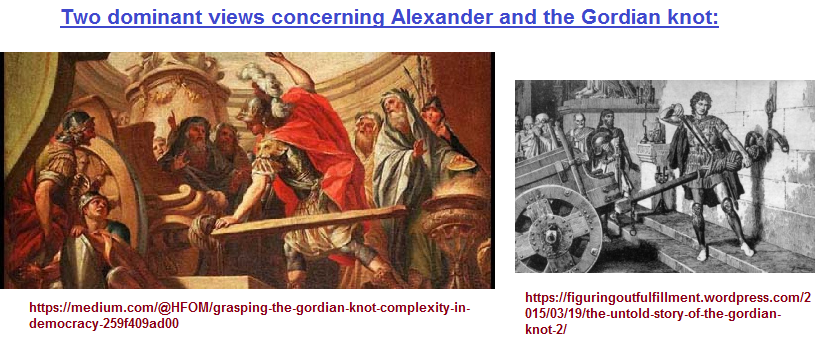
Again, the paradoxes are created by those who are intellectual predators that often times yearn to find some worthwhile path to set humanity free from its current frame of mind in one subject or another, be it mathematics, music, physics, psychology, art, acting, dance, etc... Many people want to be a trailblazer. Yet, when this yearning becomes confronted by repeated obstacles, dead ends, delays, detours and the like, they may either turn to some form of self-flagellation which creates a mood of intoxication that dulls their senses or provides an acceptable distraction, digression or general excuse; or they retreat to a 2-dimensional frame of mind in-which lies mixed and matched meanderings of box-like structures called dichotomies. In other words, they are traps. They are snares. They are constructed cells meant to entrap someone's imagination, interest, intrigue and investigation. Thus, by being entrapped by their construction of a dichotomy, you are symbolically freed from one or more conventional currencies of thought and consideration which is a pseudo- model of a newly found path.

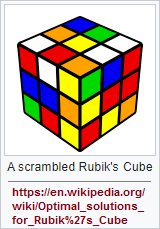
For many, the Rubik's cube creates the mood of a paradoxical frame of mind. Others find playing a particular board game, or card game, or doing mathematics a type of paradox. Any and all subjects from one perspective or another can create a paradoxical situation in a person's mind, as well as everyday occasions such a work routines, shopping, what to eat, dating, reading, cross-word puzzles, etc... Others are put into a paradoxical frame of mind when watching a magician, or hypnotist or someone who can perform rapid calculations of practiced numerical configurations. Everyday paradoxical events for one or another person need not be labeled a paradox not be labeled a dichotomy.
The ongoing presence of 2-dimensional-like thinking is a very real circumstance for which there are multiple examples of in the multitude of traditions sometimes referred to as Persistent Dichotomies, at least in Psychology, but are evident in every single subject one might care to survey, if they are self-trained (or otherwise) to identify such instances. It is very problematical because it is an extension of the frame of mind which early hominids no doubted lived in as a perception of their believed-in reality out of which their social structure was fashioned. Similarly, the present constructs of culture and society are very much fashioned by this old frame of referencing reality that is now being supplemented with a 3-dimensional frame of reference. We can use three geometric figures to highlight the developmental scenario of the human mind-set. These three are the line (linear-like), circle (circular-like), triangle (triangular-like). While some may automatically include the word "spherical" with "circular", I am inclined to view spherical as a reference where 2-dimensional (perceived as a flat entity) "roundness" has begun to straddle the line into the 3-dimensional realm of perception. However, the caveat is that history reveals that from the concept of a circle (with respect to planetary bodies), humans went to a notion of elliptical paths and then to the concept of spherical. The elliptical idea apparently provided a perceptual stepping stone (a go-between) to the idea of a sphere... which requires a proportional increase in 3-dimensional thinking.
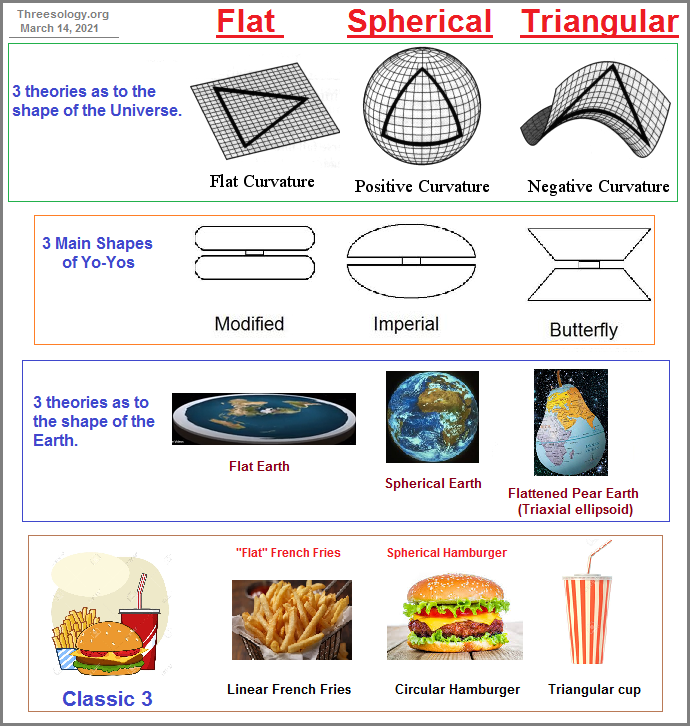
Yet, please don't misunderstand. While I am suggesting an overall transition taking place, this is not to say there have not been nor are there not particular individuals whose minds engage in leap frog-like perceptual activities whereby their mind's are confronted by advanced images that skip over transitional points of orientation which causes them to contemplate ideas which are far superior to their contemporaries in a given social or academic or workplace context, but that this does not necessarily mean they are the only ones with this capacity. Indeed, some may have the mental capacity to do so but are so overwhelmed by the images taking form in their mind that they are confronted by realizations they do not know how to interpret because they either have had not prior introduction to the possible meaning of such constructions, or they are fearful of being viewed as someone who is different, whereby "being different" in their particular social, or familial, or other day-to-day context is tantamount to being labeled weird, strange, crazy, insane, etc., in a negative way. They have not learned how to develop the necessary mental and emotional rigor to withstand the different forms of negativity one might encounter due to having an intellectual prowess above and beyond those they currently associate with, and to associate with like-minded others requires another set of personal skills that is likewise foreign to them.
Please note that the foregoing idea is a sketch of a much larger ideological excursion I am presently pursuing under the title of "Infinitesimal versus Accordian Calculus". In this excursion I am pointing out that the current models of mathematics are problematic... being built on a dominant 2-patterned frame of reference which creates a static versus dynamic orientation in mathematics preventing us from moving on from a 2-dimensional mindset into a more fully exercised 3-dimensional mindset. My present progress in this regard suggests I will not be finished for several weeks... particularly since I have two other large works-in-progress on the back burners and am required to fulfill some duties related to other orientations the sponsorship have volunteered me for.
Date of Origination: Thursday, 4th April 2021... 4:18 AM
Date of Initial Posting: Thursday, 4th April 2021... 10:19 AM
Update: Wednesday, 27th March 2024... 3:54 AM